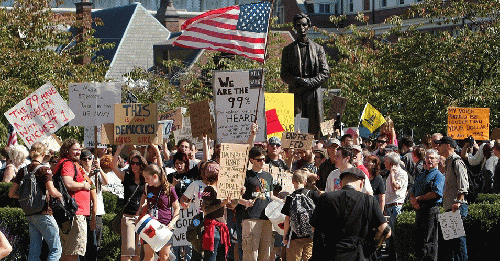Reprinted from Common Dreams

With a statue of Abraham Lincoln at center right, protesters begin their march through downtown Cincinnati during the Occupy Cincinnati protest, Saturday, Oct. 8, 2011.
(Image by (Photo/David Kohl)) Details DMCA
A Google search for the phrase "soul of the Democratic Party" yields thousands of hits, because the struggle for that soul has been a perennial subject of debate. I've probably used the phrase myself.
But after a week spent tracking the independent left's political progress, I've become even more convinced that politicians should seek the soul of the country instead. Tap into that, and the rest will follow.
Still, the debate over the Democratic soul continues. Political strategist Robert Creamer said this week that progressives have already won it. He dismisses the notion of a split between the party's "Hillary Clinton" and "Elizabeth Warren" wings, and says Democrats now largely agree on economic problems and their solutions.
"There are still pro-Wall Street, corporatist -- and even socially conservative -- elements in the Democratic coalition," Creamer acknowledges. But, he says, "it's hard to tell the difference between a Clinton speech and a Warren speech when it comes to most economic questions -- and particularly ... the overarching narrative."
Is he right?
Much of his argument rings true. It's true that voters are embracing progressive ideas, and that economic populism has become the dominant tone in Democratic politics. That's a striking victory for the left, as well as a major boost for the party. It was a watershed moment, for example, when virtually all Senate Democrats supported the Social Security expansion proposal introduced by Warren and Sen. Joe Manchin. And it's true that Clinton has adopted economic rhetoric which is Warren-like, at least in tone.
The difference lies in policy specifics, especially on critical economic issues: Warren offers them. So far, Clinton hasn't. Clinton has yet to indicate, for example, whether she supports or opposes the fast-track bill. Or Sen. Bernie Sanders' bill to break up the big banks. Or the proposal to provide four years of publicly-funded higher education. (She does support Obama's tuition-free community college plan.)
Secretary Clinton isn't alone. Many other prominent Democrats are keeping silent on these vital issues. Some continue to push for more military spending. Some supported the "Citigroup amendment" slipped into last December's budget measure, a move which benefited only the biggest banks. Others have joined with Republicans to push economy-killing austerity measures.
The progressive victories are welcome. But as long as these disappointments continue, more Democratic soul-searching is presumably needed.
What isn't needed are more disingenuous, partisan op-eds like Republican Peter Wehner's "Have Democrats Pulled Too Far Left?" Wehner cherry-picked polling data and policies to conclude, rather unsurprisingly, that they have.
He's missing the point. What matters most isn't how people label themselves, or whether they say they "trust" one party more in any given area. The issues matter most. On that score, polls show that Democrats haven't moved far enough to the left.
Large majorities, across the political spectrum, want to expand Social Security, end pro-corporate trade deals, crack down on Wall Street, and raise taxes for corporations and the wealthy. (See PopulistMajority.org for more.)
Who will speak for these voters? To win them, or even get them to the polls at all, Democrats will need to do better on the issues that matter.
Wall Street? Yes, President Obama backed the Dodd-Frank financial reform bill. But he failed to prosecute bailed-out bankers, even after the worst white-collar crime spree in modern memory -- a spree which continues to this day.
(Note: You can view every article as one long page if you sign up as an Advocate Member, or higher).





